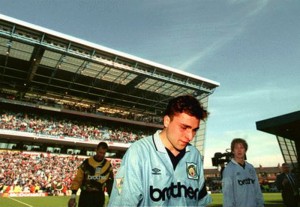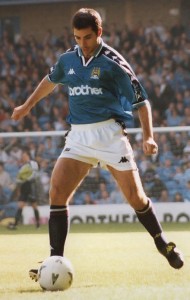The golden age of Manchester City
This article is intended as a retrospective of life as a City fan in the MCIVTA era. It is long. I’ve waffled on so much that I’ve split it in to three parts. Part one below covers the years from MCIVTA’s origin through to the epic occasion of the play-off final at Wembley. Parts two and three will map the road back to success and then explore what maybe lies in store for us now. Hopefully you can stick with me through all the verbiage.
Despite being a subscriber since the very early days, I cannot remember the last time I made a contribution to MCIVTA. Since last I wrote, City have experienced a true renaissance and entered a new age in our history. Given recent extraordinary events such as the Abu Dhabi takeover, the 6-1, the Tévez saga and a Cup win – for heaven’s sake! – it is about time I dusted off the keyboard.
Is it really seventeen years since MCIVTA started out, in the era of Brian Horton’s rants at Jack Charlton, Mike Sheron’s transfer to Norwich, Maurizio Gaudinho’s fraud case, Georgi Kinkladze’s slalom runs and Uwe Rösler’s “cabbage a**e”? That seems like an innocent age when you look back across the events of the intervening years. As fans and as a club, we have picked up a few scars along the way.
Turmoil and turnaround
The 1994/95 season that gave birth to MCIVTA was, as usual, bereft of success. The only thing to celebrate was that City stayed up – just. For long, hurtful years, we had been sorely missing a Cup final appearance or a tilt at the title and Brian Horton was having no more luck than his many predecessors.
Somehow, we all had faith that a new dawn would be just around the corner. Well, I was silly enough to have faith at least, happy to be recently shorn of Peter Swales as chairman. It would be“Forward With Franny” to glory sooner or later. Little did we know that the wilderness years were only beginning.
For me, it was the arrival of Alan Ball Jr. as manager in the following close season that started the almost terminal decline for our club. I would have to rate Ball – hand-picked by Lee, it must be said – as the worst manager we have had at City in the modern era and certainly in my time as a fan. We are not supposed to speak ill of the departed; in his case I will make an exception. He was worse than useless.

I have never felt more ashamed or eviscerated after a game than at the end of the 1995/96 season when we drew with Liverpool. Football genius Ball was telling Steve Lomas to play keep-ball near the corner flag, because a rumour had gone round the ground that a draw would secure our survival at Coventry’s expense. That rumour was false and we went down.
Ball mercifully resigned shortly into the next season; we did not have the money to sack him and pay off his contract. That relegation under him remains the low point in my life as a City fan. Tears fell after that game; maybe because I had some sixth sense about the weight of importance of that day, bearing down with forebodings for the nightmare to come.
From that Liverpool game onwards we became a joke, bouncing around the divisions with seven promotions or relegations in eight seasons, always lurching from one crisis to another. Great times were had going to games but often the dire football of the game itself ruined a good day out. Not even Frank Clark’s attempts at team-building by serenading the players with his guitar could resolve that problem. It was that bad that one of our managers, Steve Coppell, only lasted 33 days before giving up!
One match at Swindon away, shivering in plastic bucket seats hastily installed on top of a crumbling terrace, getting soaked in the howling horizontal rain as City meekly capitulated, remains emblazoned on my mind as the worst football trip ever. Less hardy souls might have called it quits at that point but somehow I and many, many others struggled through.
We often buoyed ourselves with a gallows humour aimed at our woebegone situation. We were every football fan’s favourite second team because we were not a threat and there was always the opportunity for a bit of a chuckle at our expense. Even United fans felt sorry for us. To this day, the “we lost last week and we lost today…” chant persists as a fitting reminder of those sorry times.
Crucially, we had also picked the worst possible time in football history to commit hara-kiri. The Premier League Sky money was flushing through the veins of the game for the first time, starting its total transformation into what is today’s global industry. The Champions’ League behemoth had slouched into being and the television revenues from that accelerated the effect. Throughout the football world “Manchester” meant only one thing – and it was not City.

As we sat in the old Wembley Stadium, two-nil down to Gillingham with nineteen seconds left on the clock of the Division 2 play-off final, I honestly thought that this was it for City. Still to this day I believe that another year in that god-awful division would have done for us. We would either have been wound up because of our debts or we would have faded away into a forgotten footnote of football history.
That we somehow turned it around and won that final will, I believe, be the most enduring memory of my life as a City fan. Even if (or when!) we go on to win multiple Premier League titles or back-to-back Champions’ League finals, I don’t think any football-related experience will quite match the range and depth of emotions of that day.
Before the game, everyone I spoke to knew that we needed to win. It was no ordinary final where obviously you want to win but you will take defeat on the chin. On 30th May 1999, with its background of pre-millennial angst, there was no other option than winning if the club was ever to be successful again. Everything was on the line.
So, in the space of five minutes and nineteen seconds, Kevin Horlock and Paul Dickov got the equalising goals as Mark Halsey played an egregiously long amount of injury time. Extra-time flashed by without incident; well I recall nothing of it anyway. In the end, it was the Gillingham players who choked in the penalty shoot-out. City were saved.
My abiding memory of that day is not Dickov scoring his “can you believe it?” goal, but him hitting both posts with his penalty in the shoot-out, failing to score in the most unlucky fashion possible. At that moment, doubt returned. Would fate be so capricious as to dangle the carrot of hope in front of our eyes only to cruelly pluck it away at the last and hit us with the big stick again? No, came the answer very quickly as Paul Smith, Adrian Pennock and Gary Butters – heroes to a man – all fluffed their penalties too, with a little help from Nicky Weaver of course.
Afterwards, everybody in my party was completely drained emotionally. It had meant so much and we had come so close to the precipice yet just pulled back in the most dramatic way possible. Every moment of that final had been a pressure moment and we were utterly exhausted. We did feel a twinge of remorse for Gillingham’s sake but we truly believed the win was more significant in the long-term for us than for them.
We knew we had witnessed something momentous in City’s history and were sapped of strength. It was difficult to celebrate; the plans to jump in the fountains at Trafalgar Square were quickly forgotten and we retired to a hostelry off Charing Cross Road. We had to introduce a swear-box for the word “unbelievable” as it was being abused so much. I sometimes wonder if Chris Kamara was sat ear-wigging in the corner of that pub and got the idea for his Soccer Saturday catchphrase from us. At the back of our minds, we wondered if this was a temporary reprieve from extinction, or did greatness lie in our grasp once again? Would we ever win a trophy again after so many barren years?




I almost daren’t admit it but I enjoyed our third division days and don’t in any way view them negatively.
The final at Wembley was like Roy of the Rovers story but less credible and the constant changing of division because of relegation or promotion made those very interesting times.
For Utterly Tediously Boring though see 2007 in the Premiership when a skint City couldn’t support Stuart Pearce and we scored two goals against Everton on New Year’s Day and no more at home from the beginning of 2007 to the end of the season.